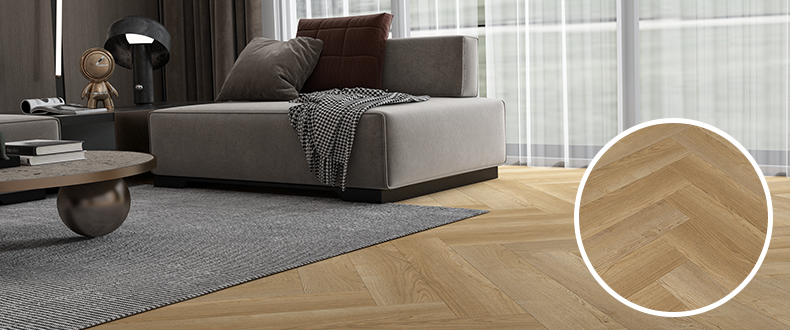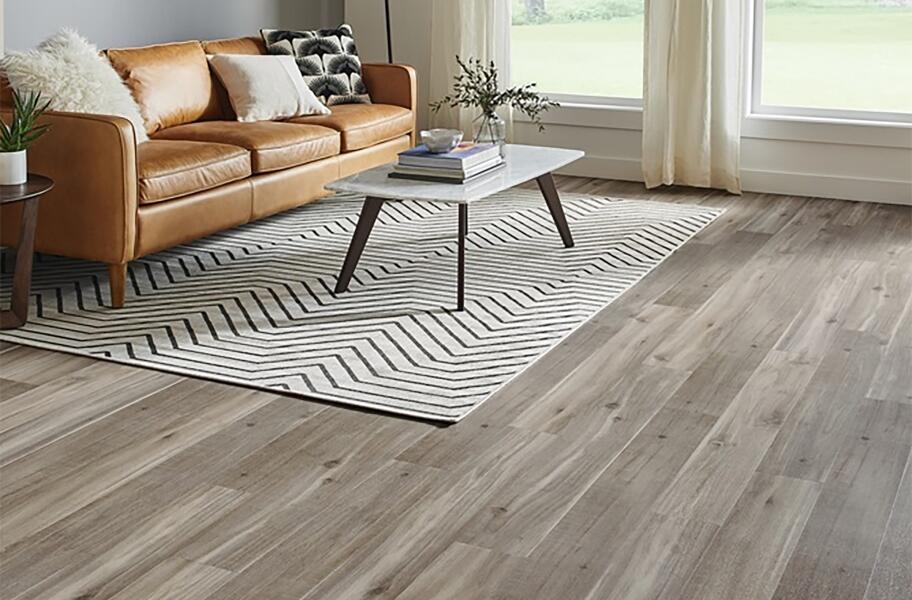
While searching for the perfect vinyl flooring, you’ve probably come across the terms SPC vs WPC. Both options are known for being 100% waterproof. SPC is a newer product with a signature rigid core that is virtually indestructible. WPC has been the gold standard for vinyl flooring and features a waterproof core that’s comfortable as well as functional.
Rigid core luxury vinyl flooring, also known as SPC flooring, is the most durable waterproof vinyl flooring option on the market. It has a similar construction to WPC, but it comes with an ultra-tough core, which is where the name “rigid core” comes from. You can install SPC rigid core luxury vinyl flooring on any level, over almost any existing (hard surface) base floor.
We are a professional certified wood-plastic flooring supplier.

WPC stands for a wood-plastic composite, which makes up the waterproof core. The WPC core is enhanced with a foaming agent, making it slightly softer and more comfortable in addition to being completely waterproof. WPC hides subfloor imperfections better than Luxury Vinyl Plank. Regular LVP flooring is made from 100% virgin vinyl but does not have a rigid core. This rigid core is beneficial when the existing subfloor is defective, so it reduces the time and cost of subfloor preparation during installation. If the subfloor is not smooth enough, over time defects may be signalled through the LVP.
Meanwhile, an SPC core is made from stone plastic composite. The stone is stiffer, sturdier and less resilient. The SPC has no foaming agent added, giving it a stronger, more robust core.
Because SPC is so durable, unbending, and virtually indestructible it’s often used for high-traffic commercial spaces. That rigid core also makes it less susceptible to dents, and that’s always a plus in areas with lots of heavy furniture or traffic.
If you were to compare these different options to different kinds of carpets, WPC flooring is like a plush, luxurious home carpet, while SPC rigid core is more like a commercial carpet. One is more comfortable, the other is more durable, and they both do their jobs really well.

SPC vs WPC is not much different in the design provided by each. With today's digital printing technology, SPC vs WPC tiles and boards similar to wood, stone, ceramics, marble and unique finishes can be easily produced visually and textured.
In addition to design options, recent progress has also been made in different format options. Both SPC vs WPC flooring can be made in many forms, including wider or longer planks and wider tiles. Multiple lengths and widths packed in the same carton are also becoming a popular choice.
Similar to dry-backed luxury vinyl flooring (which is a traditional type of luxury vinyl that requires an adhesive to install), SPC and WPC flooring consist of multiple layers of backing fused together. However, unlike dry back flooring, both flooring options have a rigid core and are a harder product.
Since the core layer of SPC is composed of limestone, compared with WPC, it has a higher density but is thinner overall. This makes it more durable compared to WPC. Its high density provides better resistance to scratches or dents on heavy objects or furniture placed on it and makes it difficult to expand under extreme temperature changes.
One important thing to note is that although SPC vs WPC is often advertised as waterproof, they are actually waterproof. Although these two products are not completely waterproof if immersed in water, if they are properly cleaned within a reasonable time, local overflow or moisture should not be a problem. Click for more information.
Rigid core products including WPC vs SPC were originally created for the commercial market because of their durability. However, homeowners have also begun to use rigid cores because of their ease of installation, design options, and durability. It’s important to note that some SPC vs WPC products vary from commercial use to light commercial use, so it’s best to always consult your manufacturer for the applicable warranty terms.
In addition to the easy-to-install click-and-lock system, another highlight of SPC vs WPC is that they do not require extensive subfloor preparation before installation. Although installation on a flat surface is always a good practice, SPC or WPC floors are easier to hide floor defects such as cracks or dents due to their rigid core components.
Moreover, in terms of comfort, WPC is generally more comfortable than SPC and has a lower density because it usually contains foaming agents. Therefore, WPC is particularly suitable for environments where employees or customers often stand up.
In addition to providing more cushioning when walking, the foaming agent in WPC also provides more sound absorption than SPC flooring, although many manufacturers provide acoustic backings that can be added to SPC. WPC or SPC with acoustic backing is ideal for environments where noise reduction is critical, such as classrooms or office spaces.
The price of SPC vs WPC flooring is similar, but SPC is usually more affordable. In terms of installation costs, the two are generally comparable, because both do not require the use of adhesives, and both can be easily installed with a click-and-lock system. Finally, this helps reduce installation time and costs.

As for which product is better overall, there is no clear winner. WPC vs SPC has many similarities and some key differences. WPC may be more comfortable and quieter under your feet, but SPC is denser. Choosing the right product actually depends on your flooring needs for a particular project or space.
If you find this comparison of SPC vs WPC flooring helpful, you can find more information on our blog.